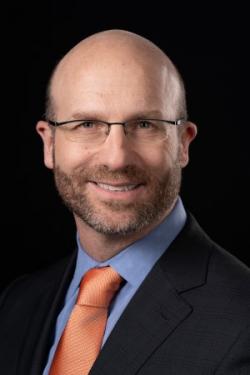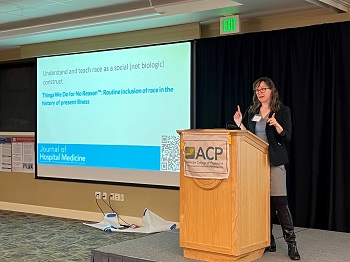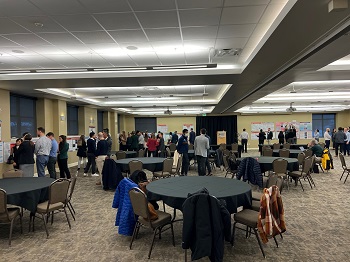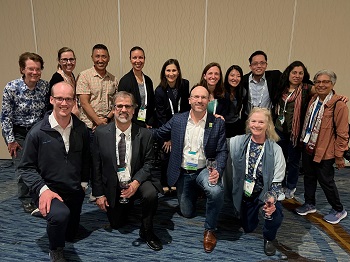

Scott C. Woller, MD, FACP, ACP Governor
Greetings from the Governor
It has been an action-packed quarter since my last update.
It is my privilege to report that the 2023 ACP Utah Chapter Scientific Meeting was an absolute delight. As so many of you who attended experienced, we were regaled with insight and perspective by our nationally renowned Keynote Speaker Dr. Eileen Barrett, MD MACP. In her presentation, “Leveraging Diversity and Inclusion to Improve Outcomes”, Dr. Barrett laid bare the tremendous potential that exists for us as physicians and individuals being mindful of inclusiveness in our approach to patient care and everyday life. I was honored to acknowledge our Chapter awardees John P. Burke MD, MACP (Advanced to Mastership), Mairi Leining, MD (Volunteerism & Community Service Award), Katie Lappé MD, FACP (Laureate Award), Erik Riessen MD, FACP (Distinguished Teacher & Mentor Award), Sonny Win MD, FACP (Chapter Leader Award), Benjamin Harris MD (Resident Recognition Award for Leadership), and Anurag Tripathy (Medical Student Award). Many thanks to Dr. Aaron Crosby, MD, Chair of the Scientific Meeting Committee and all committee members!

The Poster Competition led by Dr. Emily Signor, MD, FACP was a tremendous success with a total of 46 (!!) poster submissions. It was Julia Gray MD and Alex Montoya MD who took away the grand prize this year!

The hard work of our Membership and Retention Committee Drs. Sonny Win, MD, FACP, Yaw Boateng MD, FACP and Jennifer Scott MD, FACP in conjunction with the response from EACH OF YOU (our members) led to our Utah chapter being recognized with a top award for the Chapter Challenge Outreach to Unpaid Membership. ACP Utah Chapter was presented two (2) $1000 awards to offset the expense for travel of two of our early career physician to ACP 2023 in San Diego! THANK YOU for your continued engagement in our ACP!
ACP 2023 in San Diego April 28-30 was spectacular. 78 Utahns registered as attendees and It was such a privilege to walk with our newly advanced fellows and to see so many of you at the Utah Chapter social.


Are you interested in Healthcare Policy that continues to shape how we practice medicine every day and into the future? Please consider joining our Healthcare Policy Committee! Please reach out to our Executive Director Ms. Cami Bills at: contact@utahacp.com to learn more.
Indeed, please reach out to me directly with how you might be interested in being involved and engaged in our Chapter and thank you for all that you do for your patients, colleagues, and the advancement of Internal Medicine.
I wish you and your loved ones an active, healthy, and safe summer season.
Sincerely,
Scott C. Woller, MD FACP FCCP
HOT TOPICS
PRESIDENT’S MESSAGE | JULY/AUGUST 2023
Silent epidemic: Alcohol and preventable death, despair
Alcohol use disorder is often linked to poverty, unemployment, social isolation, and other social determinants of health, and medicine must address these underlying factors to genuinely reduce the risks associated with alcohol.
By Omar T. Atiq, MD, FACP
As a nation, we must direct our attention towards preventing the illness and death associated with smoking, hypertension, diabetes, and obesity—the four leading causes of preventable death. The United States has also spent over a trillion dollars in the past 50 years on the “war on drugs,” due to their enormous societal cost. Surprisingly, the deadliest drug of all, alcohol, has been excluded from this crusade.
In 2021 alone, drug overdoses claimed the lives of 106,699 Americans, while over 140,000 deaths were attributed to alcohol-related causes. Adding to this grim picture, the CDC reported 20,958 firearm homicides and 26,328 firearm suicides during the same period, with nearly half and one-third of these incidents, respectively, involving alcohol consumption.
Alcohol is treated differently than other psychoactive drugs in many countries, including ours. Perhaps it's due to its cultural acceptance or widespread use. The influence of the alcohol industry permeates the highest echelons of political power at both state and national levels. Despite the failure of Prohibition in the early 20th century, the U.S. government resorted to regulating and taxing alcohol, but this did not compensate for its detrimental economic impact. Shockingly, even professional health care organizations hold social gatherings where alcohol is readily accepted.
It is well established that alcohol consumption is a known causal factor in over 200 diseases and injuries. It not only poses a significant risk for cardiovascular disease, cancer, and cirrhosis but also leads to behavioral and mental health disorders that result in physical and emotional harm and, all too often, death, including those of our loved ones. Alcohol-related problems extend to issues such as suicide, homicide, road traffic accidents, and domestic violence. The detrimental effects of alcohol can even begin before birth, contributing to preterm birth complications and fetal alcohol syndrome. As physicians, we witness suboptimal outcomes in patients suffering from HIV/AIDS, tuberculosis, cancer, and cardiovascular diseases due to continued excessive alcohol consumption. Unfortunately, many individuals remain unaware of the toxic effects until it's too late.
Globally, alcohol is responsible for 3 million premature deaths, accounting for 5.3% of all global deaths. It is the seventh leading cause of premature death and disability worldwide and the leading cause among individuals ages 15 to 49 years. Alarmingly, the rate of premature death from alcohol in the United States is increasing, with 28.07 deaths per 100,000 people in 2019 compared to 23.59 in 1999. Removing alcohol consumption could prevent 4.9% of deaths in our country, potentially having saved 169,475 lives in 2021 alone. The disability-adjusted life-year (DALY) provides a holistic measure of disease burden, incorporating mortality as well as years lived with disability. Alcohol use disorder carries a DALY of 345.48 per 100,000 people.
According to the National Institute on Alcohol Abuse and Alcoholism, 85.6% of people in the United States have consumed alcohol at some point in their lives, with 69.5% drinking within the previous year and 54.9% in the previous month. Binge drinking affects approximately a quarter of those who consume alcohol. Alcohol use disorder affects an estimated 14.5 million Americans, including a particularly troubling 414,000 adolescents ages 12 to 17 in 2019.
What is truly inconceivable is that less than 8% of individuals, regardless of age or gender, receive treatment for their alcohol use disorder. Even when they seek medical attention, it is often for alcohol-related medical problems rather than addressing the underlying cause itself. Alcohol-related emergency department visits increased by 50%, from 3 million to 5 million, between 2006 and 2014. Consequently, the total cost of these visits skyrocketed from $4.1 billion to $15.3 billion, further burdening an already strained health care system.
Given that alcohol use disorder is often linked to poverty, unemployment, social isolation, and other social determinants of health, we must address these underlying factors to genuinely reduce the risks associated with alcohol. The stigma surrounding alcohol use disorder must be eliminated, and individuals struggling with it should have easy access to evidence-based treatment and support services.
The quality of life and the sense of happiness we experience are dependent on both mental and physical health and a sense of security. These factors form the foundation of a progressive and compassionate society. However, our country, despite its immense wealth and technological advancements, ranks 56th in the crime index, lagging behind 139 countries, and a staggering 16.5% of crimes in our nation are alcohol related. The annual cost of alcohol use disorder in the United States is estimated at $249 billion, surpassing the cost of illicit drug use, which stands at $193 billion. This comparison is made not to diminish the importance of addressing the illicit drug crisis, but rather to highlight the willful ignorance we display regarding the devastating impact of alcohol.
Alcohol consumption, particularly excessive use, represents a public health crisis that poses significant risks to our well-being. Recent data confirm that even small amounts of alcohol can increase the risk of cancer and cognitive decline. Even those who argue that one drink a day may be beneficial for the heart and blood glucose control acknowledge that surpassing this limit raises the risk of heart attack, stroke, and premature death. The evolving perspective is that no amount of alcohol, no matter how small, is entirely risk-free. Just as we do not recommend an occasional cigarette, the same caution should be applied to alcohol.
It is high time we challenge the conventional wisdom that equates alcohol with celebration and good times. Instead, we must recognize its tremendous health risks to individuals, happiness, and life itself. This begins with raising awareness and educating our schools, colleges, and the public through social media and robust public health campaigns about the dangers of even casual alcohol use. While Prohibition failed, laws regulating the sale and consumption of alcohol, including limiting hours and locations where it can be sold and restricting access for those at higher risk, must be strictly enforced, with stiff penalties for alcohol-related offenses.
Together, we must confront the preventable death and despondency that alcohol inflicts upon our society. By addressing this urgent issue, removing the stigma, and providing accessible treatment and support, we can safeguard our collective well-being and build a healthier, happier future for all.
Omar T. Atiq, MD, FACP, ACP's President for 2023-2024, is a professor of medicine at the Winthrop P. Rockefeller Cancer Institute at the University of Arkansas for Medical Sciences in Little Rock. He received his medical degree from Khyber Medical College at the University of Peshawar in Pakistan and completed his fellowship in medical oncology and hematology at Memorial Sloan Kettering Cancer Center in New York. He is board certified in medical oncology, hematology, and internal medicine.
Call for Spring 2024 Resolutions
Are you concerned about a practice or clinical issue or have an idea you'd like to suggest? If so, you might consider submitting a resolution to your Governor or chapter council. Call for resolutions to be heard at the Spring 2024 Board of Governors Meeting. Initiating a resolution provides ACP members an opportunity to focus attention at the ACP national level on a particular issue or topic that concerns them. Deadline 10/16/23

